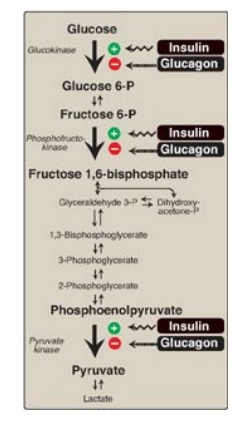Hormonal Regulation of Glycolysis
| Home | | Biochemistry |Chapter: Biochemistry : Introduction to Metabolism and Glycolysis
The regulation of glycolysis by allosteric activation or inhibition, or the covalent phosphorylation/dephosphorylation of rate-limiting enzymes, is short-term (that is, they influence glucose consumption over periods of minutes or hours).
HORMONAL REGULATION OF GLYCOLYSIS
The regulation of
glycolysis by allosteric activation or inhibition, or the covalent
phosphorylation/dephosphorylation of rate-limiting enzymes, is short-term (that
is, they influence glucose consumption over periods of minutes or hours).
Superimposed on these moment-to-moment effects are slower, and often more
profound, hormonal influences on gene expression, or the amount of enzyme
protein synthesized. These effects can result in 10-fold to 20-fold increases
in enzyme activity that typically occur over hours to days. Although the current
focus is on glycolysis, reciprocal changes occur in the rate-limiting enzymes
of gluconeogenesis, which are described in Chapter 10. Regular consumption of
meals rich in carbohydrate or administration of insulin initiates an increase
in the amount of glucokinase , phosphofructokinase, and PK in the liver (Figure
8.23). These changes reflect an increase in gene transcription, resulting in
increased enzyme synthesis. High activity of these three enzymes favors the
conversion of glucose to pyruvate, a characteristic of the absorptive state.
Conversely, gene transcription and synthesis of glucokinase,
phosphofructokinase, and PK are decreased when plasma glucagon is high and
insulin is low (for example, as seen in fasting or diabetes).

Figure 8.23 Effect of insulin
and glucagon on the synthesis of key enzymes of glycolysis in liver. P =
phosphate.
Related Topics
